|
Guston Road
Guston
01304 206162
https://the-chance-inn.business.site/
https://www.facebook.com
https://whatpub.com/chance-inn
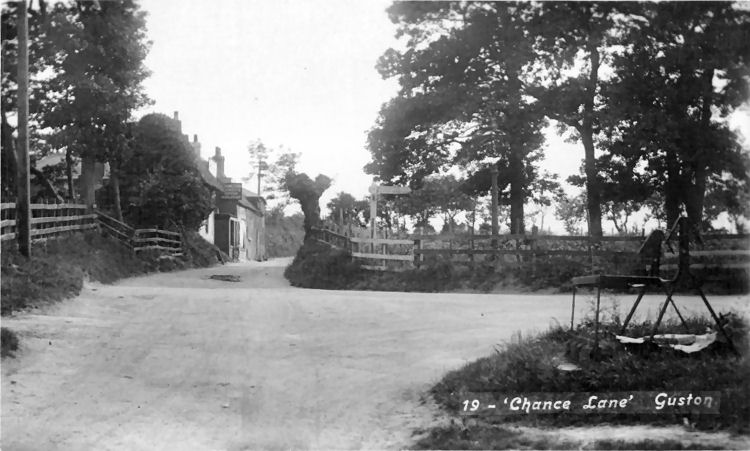
Above postcard, circa 1915. |
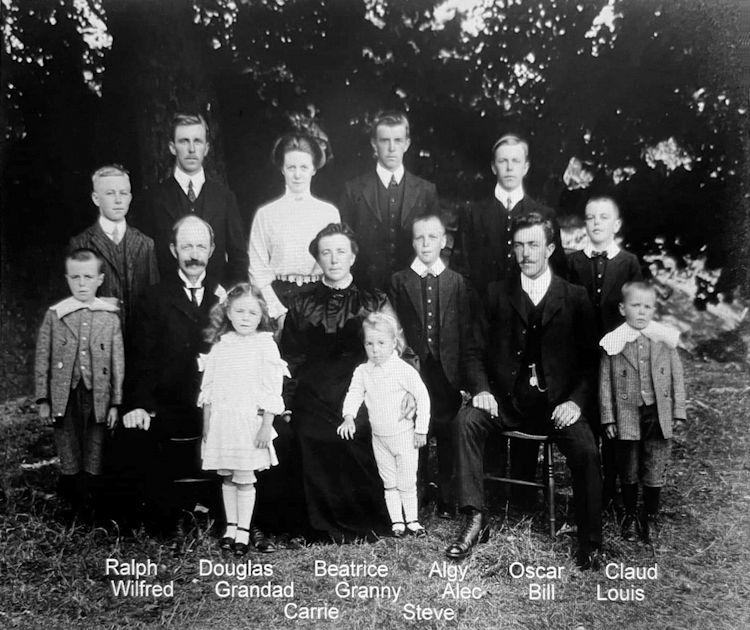

Above photo, 1911, names supplied by Roy S Norris. Licensee William
Norris and wife had 15 children, 12 who survived. |
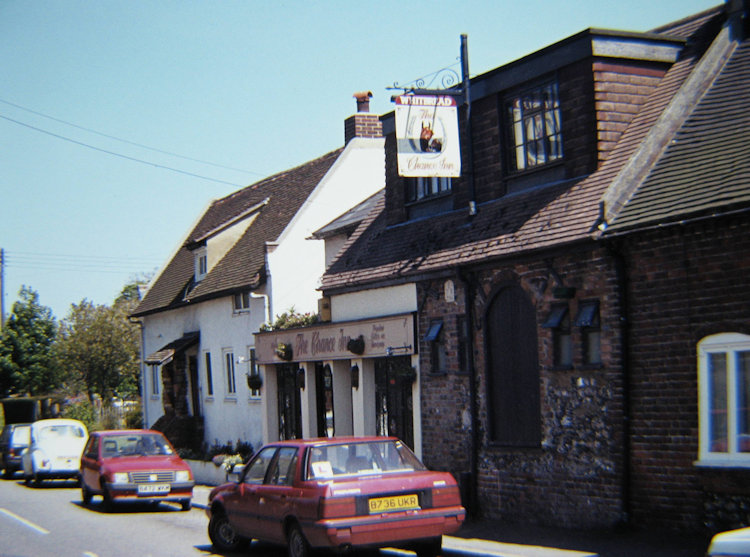
Above photo, 26 June 1986, by Jim Ashby. |
|
|
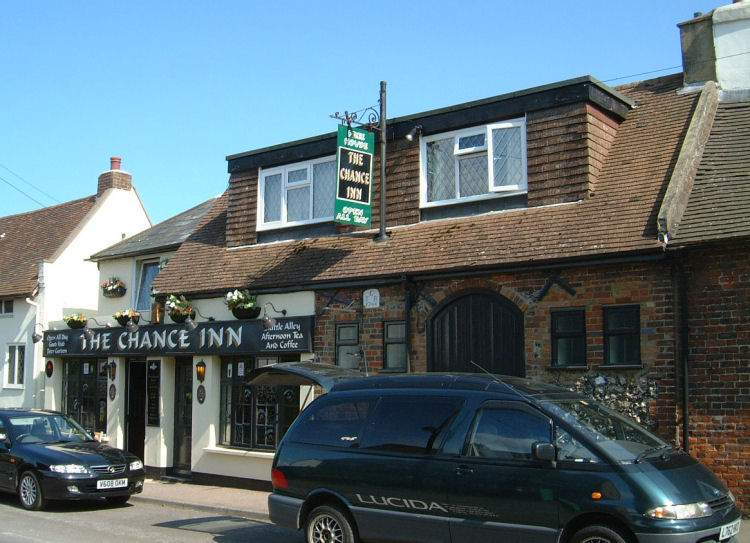
Above photograph of the Chance Inn by Paul Skelton 4 August 2007. |
|
|
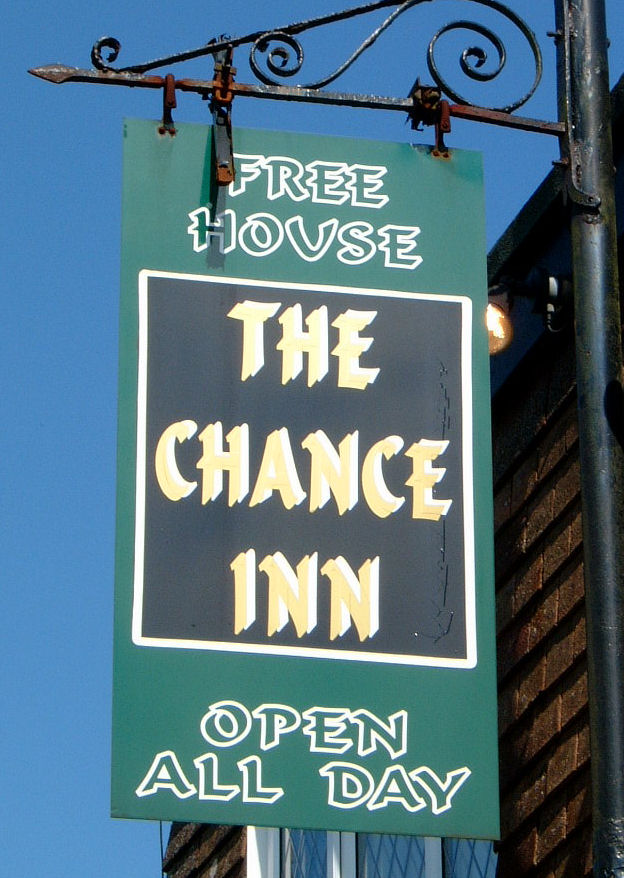 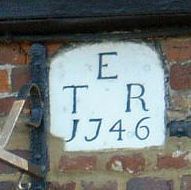 |
|
Above photograph of the Chance Inn by Paul Skelton 4 August
2007 |
A stone laid into the pub states the T E R 1746, so the building is
obviously mid eighteenth century but looks like it has been renovated and
altered over time. I do not know what the letters stand for, probably the
initials of the original builder.
Supplied by Alfred Leney Co Ltd, who bought out Thomas Walker's Phoenix
Brewery in 1859 and registered as such in 1896, until bought out by Fremlin
Brothers brewery of Maidstone in 1926, brewing at the Dover brewery ceased
in 1927, which later passed to Whitbread.
The "Chance Inn" sign of the 1980s used to depict Red Rum one of the most
famous ‘chances' of all time. The house acquired its name when an eighteenth
century farmer bought it and converted it to a pub for his workers, thus
taking a chance by competing with the established village inn, the "Plough."
|
From the Dover Express and East Kent News, Friday 18 January, 1895.
SELLING BEER WITHOUT A LICENSE
George Edward Harris was charged with selling beer at the “Chance,”
Guston, without a license on 22nd December last.
Defendant pleaded guilty, and Mr. Mowll who appeared on his behalf said
that it seemed that on the last Court day the defendant attended with
the view of asking for temporary permission to draw at the “Chance”
beer-house, Guston. No formal application however was made, but the
defendant afterwards seemed to be under the impression that he would be
doing nothing wrong in selling until the next sitting of the Court in
Dover. No doubt it was a technical offence for which the defendant was
sorry.
The Magistrates took a lenient view of the case and imposed a fine of
20s. including costs.
Subsequently Mr. Mowll made an application of behalf of Mr. Harris for
permission to draw at the “Chance” and the Magistrates taking his
previous good character into consideration gave permission.
|
|
From the Dover Express and East Kent News, Friday 18 January, 1895. Price 1d.
AFTER CLOSING TIME
John Walter Baker, and John Pierce Wellard were charged with being on
licensed premises of the “Chance,” Guston, after closing time. Both
pleaded guilty and the Magistrates imposed a fine of 9s. each including
costs.
|
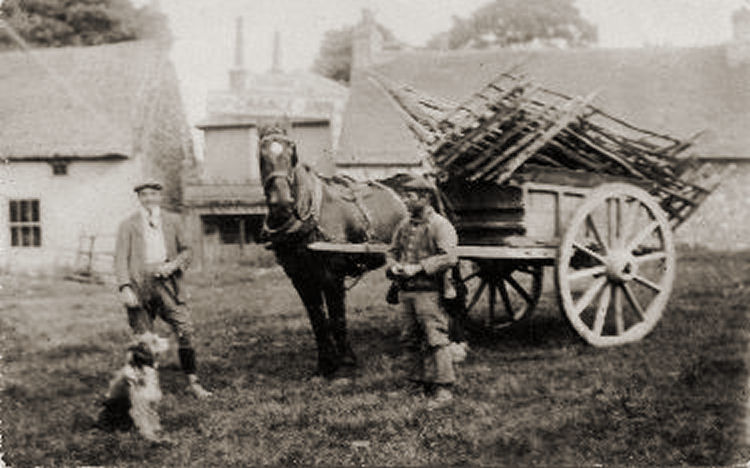
Above photo taken in 1895 shows a farm cart and labourer in a field
opposite the Chance Inn (in background), the field is now the site of
Brompton Villas.
|
|
From the Dover Express and East Kent News, Friday 18 January, 1895. Price 1d.
THE CHANCE, GUSTON
Mr. Knocker applied for the confirmation of a provisional licence ,
granted at the East Kent Quarter Sessions to the Chance Inn, Guston.
Mr. F. G. Hayward, a member of the firm of Messrs. Worsfold and
Hayward, produced the plan laid before the Quarter Sessions at
Canterbury, and also a plan showing enlargements since effected to add
to the accommodation. The bar parlour was 7ft. by 13ft., and the tap
room had been enlarged to 11ft. by 20ft.
Superintendent Chaney said that he was satisfied with the way the
work had been carried out.
The application was granted.
|
|
Dover Express, Friday 17 May 1895.
More bonafide travellers.
Samuel Dixon, a civilian, Henry Bailess, and William Fould,
Artillerymen, stationed at the Castle, were charged with being
unlawfully on licensed premises, the "Chance," Guston, during closing
hours on Sunday, April 28th.
Police Constable Adams proved finding prisoners in the "Chance" on the
day in question. On being questioned, the Artillerymen
said they came from Deal, and the other man said he was from Folkestone.
The Superintendent said there was no doubt that the landlord believed
the men were bonafide travellers, and they had not
proceeded against the landlord.
The Bench fined Dixon 11s., including costs, and the two artillery men
8s. each, including costs.
|
|
Dover Express 21st September 1900.
GUSTON.
Permission for an hour’s extension on the night of the harvest supper at
the "Chance Inn" on September 26th was granted.
|
|
From the Dover Express, Friday 16 October, 1903.
THE DUKE OF YORK SCHOOL.
An occasional license was granted Mr. W. S. Norris, of the Chance Inn.
Guston, to supply intoxicants at Frith Farm, on October 21st. on the
occasion of the stock and farm sale there, caused by the farm being
obtained for the Duke of York School.
|
|
Dover Express 29 September 1911.
PROPERTY SALE YESTERDAY.
Messrs. Terson and Son held a sale of property at the Auction Mart
yesterday.
Including "Chance Inn," Guston, sold for £900.
|
|
From the Dover Express and East Kent News, Friday, 28 February, 1913. Price 1d.
KILLED WHILE INJECTING MORPHINE IN A TUNNEL
Mr. R. Mowll (Coroner for East Kent) held an inquest at the “Chance
Inn,” Guston, on Saturday afternoon, to inquire into the circumstances
surrounding the finding of the mutilated body of Claud William Laurence
Marshall a short distance inside the Guston tunnel on the previous
Friday morning.
Mr. R. Mowll, in opening the inquest, said it had been suggested that
the deceased was in the habit of occasionally going into the tunnel for
the purpose of injecting morphia.
Mr. Morton Pickett was chosen foreman of the Jury, which, having viewed
the body heard the following evidence:-
John Fortune, 25, Bridge Street, Dover, a platelayer of the S.E. and C.
Railway Company, said: On Friday, about 7 a.m. I was entering the Dover
and Deal tunnel, near the Danes, to go to work, when I saw the body of
the deceased about fourteen or fifteen yards inside the tunnel. The body
was laying face downwards, the head towards Dover, the left leg lying in
the four foot way of the uproad from Martin Mill. Most of the body was
lying between the outer rail and the side of the tunnel. The body was
cold, and I moved it clear of the rails and left it in charge of two men
whilst I communicated with the Borough Police. Outside the tunnel on the
downside, near Mr. West's garden, there were marks on the bank as if
someone had slipped down.
Police-sergeant Hayden, K.C.C., stationed at Walmer said: About mid-day
on the 21st February, from information received I went to the Dover
entrance of the Guston tunnel where I saw the body of a man lying on the
outside of the up rail. I searched the body and found the following
articles: a handkerchief marked C. L. Marshall, and empty hypodermic
syringe case, a phial of pills, a portion of a hypodermic syringe, and
1s. 7d. in money. The glass portion if the syringe was missing. Upon
searching the ground in the vicinity of where the body was found I
discovered a portion of a hypodermic Syringe. There was also an envelope
in the deceased's pocket bearing the address of a London chemist, and
addressed to L. Marshall, Esq. About 180 yards from the entrance to the
tunnel a railway employee pointed out marks on the bank apparently where
someone had slipped down from over the top – about forty to fifty feet.
Pieces of turf and chalk had been dislodged, but at the bottom of the
bank there was nothing to show that anyone had been injured on the
railway. The body was found fifteen yards inside the tunnel. Twenty four
yards inside there were portions of the body and marks which no doubt
showed that the body was struck by the train at that spot. I examined
the body and found extensive injuries to the head. The left leg was
severed at the thigh and above the knee. With the assistance of some of
the railway officials the body was removed to Guston. The part of the
hypodermic syringe was found twenty-four yards inside the tunnel. Upon
examining the clothing I found the braces were fastened to the trousers
on the right side and back only, the left side being unfastened. It
appeared that the trousers of the left side had been let down.
Augustine Martin Marshall, living at Barntye, Guston, said: The
handkerchief produced and the envelope were the property of my husband,
Claude William Laurence Marshall, aged 41 years. He was formerly a
lieutenant of the South Staffordshire Regiment, but of no other
occupation. I last saw him at 2.10 p.m. on Thursday. He had been ill,
and seemed weak, but said he would go into Dover for some fish for his
tea. The doctor had ordered that he should not walk quickly, so I told
him not to hurry up the hill. He did not return. At one time he often
slept out of doors under hedges or anywhere, so that I did not worry
very much. He used to suffer from double stricture, and before he was
operated upon injected morphine and cocaine into his system. He gave it
up from January to July, and then broke out again, and I once found him
in a pit up here. He found things dull when the children went to school.
I did not thin k that he touched any drugs since July. About a fortnight
ago he came beck from London after spending a fortnight with his mother,
and I think that he must have broken out there, but he did not tell me.
I thin k that was as well as going for the fish on Thursday he also went
to get himself some drug, because he left both his dogs with Mr.
Pritchard, as he did not like them with him when his head ached or when
they were troublesome. I asked him to call and see Mr. Fletcher, who
lives on the hill near the tunnel, about some goats. Evidently he
stopped on his way there and went into the tunnel to take some morphia.
It was a bright noonlight night, and I know that he occasionally went
into the tunnel to inject the morphia into his leg. He went in because
he could not do it outside where people were often about. He generally
took ten minutes to make the injections, usually three, and allowed two
or three minutes between each injection. I remember that he once told me
as a joke that one night he had been in the tunnel and came out and
stood on the bridge and counted everything in his pockets to see if they
were all right, and must have fallen asleep, for he woke up and saw the
lights of a train coming towards him and received a great fright. I had
beseeched him not to go inside the tunnel because I though that if he
fell asleep on the bridge he might fall asleep in the tunnel. I do not
know how far in it was that he was found, but I know that he would go
inside so that nobody would be able to see him. He had no hypodermic
syringe at home, and if he did have one he must have concealed it. He
was 41 years of age, and has an estate at County Limerick, Ireland,
where his tenants literally worshipped him. He was a thorough Irishman
and of a happy disposition. He was never despondent, but fond of life.
He formerly took sixteen grains of the drug a day, and we got the dose
down to eight, and at last six, after which he gave it up. I thought
that the doctor had ordered him to take a certain amount of something,
and that he took the lot, and feeling very bad went to buy morphia and
cocaine. I was breaking him of the habit. He suffered from indigestion,
and was taking Oataline and Fry's Malted Cocoa.
Witness, in reply to the foreman as to whether the deceased would become
dazed after taking the dug, said it depended upon the quantity taken.
Arthur Charles Kay, 40, High Street, Dover, a pharmacist, said: I knew
the deceased gentleman very well as a customer. He used to purchase
drugs from me. On Thursday he called at 4.30 p.m. and said he had broken
out again and was unable to do without the drugs, and asked for the
usual quantity. I gave him six grains of cocaine and six grains of
morphine, in two separate powders. He had no bottles, and I provided him
with the two produced. In each I put six drams of distilled water. He
said he had lost his hypodermic syringe, and he bought another one from
me, of which the portion (produced) is a part. He administered some
cocaine in his arm. When he commenced dealing from me over a year ago he
brought me a prescription. I know that he used to go into dark places in
order to inject the morphine, and occasionally I allowed him to use my
private compartment. When injecting the morphine he would have to take
the left part of his trousers down.
The Coroner: It was a pity that he got back to the habit.
Witness: In another three months he would have become a wreck again. He
was a very nice fellow.
Albert Edward Pritchard, grocer, Biggin Street, Dover, said: At about
6.30 p.m. the deceased came to my shop and asked if he could have his
two gods with me whilst he went to the King's Hall, saying that he would
return for them about 8.30. he left, but did not return. He was a
thorough gentleman, and I am sure he had no suicidal tendencies. He was
always in good spirits.
Acting-sergeant Southey, of the Dover Borough Police, said: On Thursday
afternoon I saw Mr. marshall in Kay's, the chemist, and also in Cuff's.
he appeared to be in his usual spirits. He was well known by all the
members of the force. As a result of enquiries from Mr. Craig, manager
to Mr. Marcombe Cuff, I have ascertained that the deceased called at
that shop on Thursday afternoon about 5.30 p.m., and asked for something
to produce sleep, and complained of sleeplessness. Mr. Craig sold him a
phial of 25 tablets.
Police-sergeant Hayden said that one of the tablets was missing.
Dr. Joseph Richardson, of Dover, and Poor Law Officer for Guston, said:
I have examined the body and found that the top of the head had been
carried away. The left thigh is almost divided. There are many cuts and
abrasions on the body. I should think that the deceased was bending down
and was so interested in injecting the morphine that he did not notice
the train coming and was struck on the head.
Witness, in reply to the foreman, said he did not think that the
deceased became dazed after using the drug; not with a man like the
deceased. He would probably be oblivious to anything except what he was
doing – injecting the morphine.
The witness Fortune, recalled, said the distance between the outer rail
and the side of the tunnel where the body was found, was about three
feet. By stooping over, the deceased's head would be above the rail and
would be struck by the engine just below the buffers.
P.S. Hayden, in reply to the foreman, said that no marks had been found
on any engine, or any report received from any driver as to anything
unusual happening.
The Coroner, in summing up, said that it was quite possible that the
deceased was so interested in the act of injecting the morphine that he
did not notice the train approaching, and was therefore knocked down and
killed. It was a very sad case, and it was also a very terrible thing to
notice what a fearful hold these drugs took upon people.
The foreman said the Jury agreed that the deceased met his death by
misadventure, and considered that as well as the deceased being so
intent in his actions, the fact of there being a gradient in the tunnel
would account for less than the usual noise caused by an approaching
train.
|
|
Dover Express 08 January 1915.
L. A. I. O. O. F.
After having been closed for five months, the New Century Lodge, No. 14,
L. A. I. O. O. F., at the "Chance Inn," Guston, will be reopened on
Wednesday, January 13th, at a meeting at 7.30, on which occasion a good
attendance of members is expected.
|
|
From the Dover Express and East Kent News, Friday, 17 February, 1922. Price 1½d.
ADJOURNED LICENSING MEETING
The report of the police on the licensed houses in the district, which
was first presented at Wingham on February 2nd, and published at the
time, were again read over.
Plane for the alteration to the “Chance Inn,” Guston, were submitted by
Mr. F. G. Hayward, and approved, the improvement being an alteration to
the staircase.
|
Nowadays the interior is decorated with a racing and golfing theme and as
well as skittles being played at the elevated back garden, the pub also
boasts a putting green.
|
From the Dover Express and East Kent News. 7 January 1938.
Price 1½d.
An extension was granted to the "Chance" at Guston till 10.30 p.m.,
on 29th January for the Thrift Club annual dinner.
|
|
From the Dover Express and East Kent News. 20 January 1939.
The licensee of the "Chance Inn," Guston, was granted an
extension till 11 p.m. on January 28th for the Thrift Club annual
dinner.
|
|
From the Dover Express and East Kent News, Friday 21
March, 1947
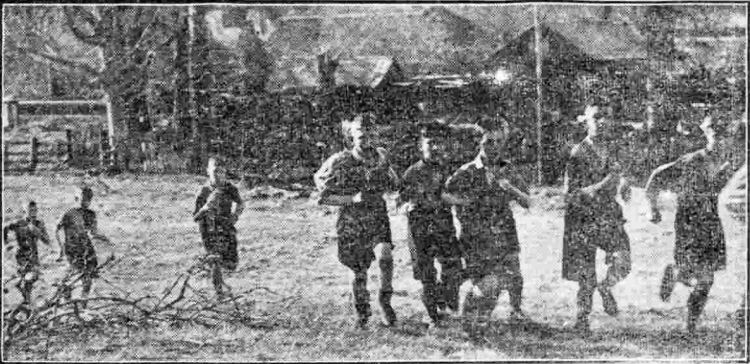
Competitors in the Duke of York's R.M. school intermediate cross-country championship, crossing a field near the "Chance Inn," Guston, on Tuesday
afternoon.
|
|
From the Dover Express and East Kent News, Friday 9
October, 1953.
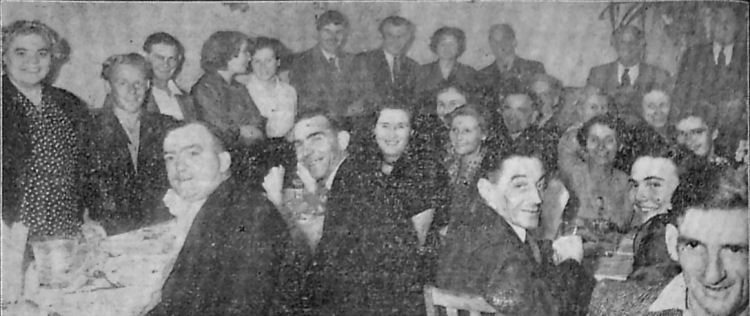
HARVEST SUPPER
Members and guests at the harvest supper held at the Chance Inn,
Guston, on Saturday evening.
|
|
From https://www.facebook.com
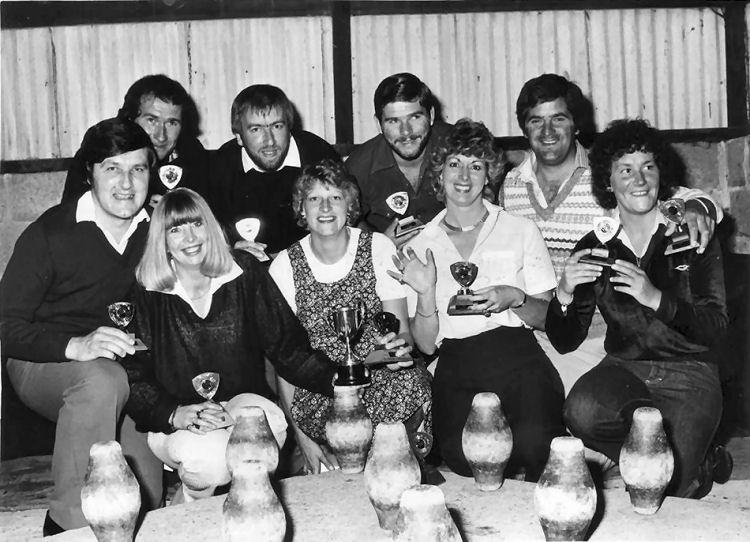
Above photograph fro around 1984 shows the mixed skittles team of the
"Chance."
From left to right are John Durrant, Alf Huntley, John Husk, Gary
Ambrose, Tony Kember.
Women: Sandy Cribben, Lynn Reddings, Barbara Morris, Val Reddicliffe. |
|
From the Dover Express, 21 May, 2009
Pub mystery fun
A MURDER-mystery evening is being held tomorrow (Friday) from 7.30pm
at the Chance Inn in aid of St Martin's Church, Guston.
|
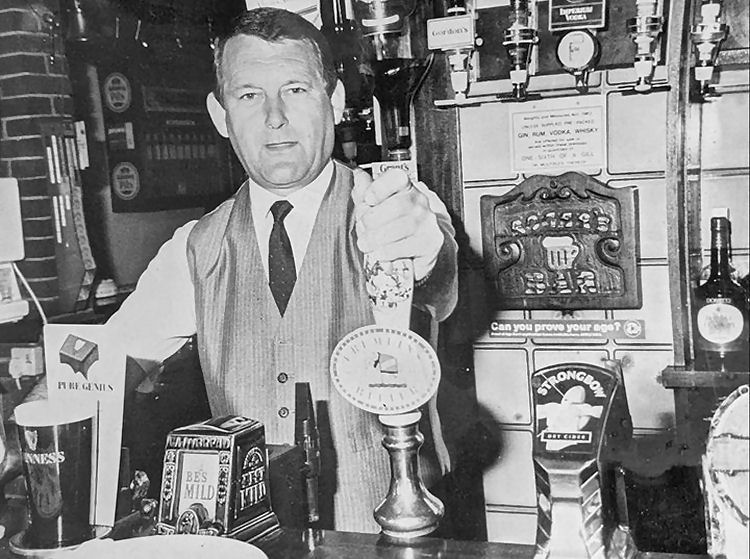
Above photo showing licensee Roger Morris, circa 1980s. Sadly died
29 December 2020. |
LICENSEE LIST
PRESCOTT Mary 1871+
(age 75 in 1871 ) )
WHITE George 1891+ (widower age 75 in 1891 ) )
COURT James to Feb/1895

HARRIS George Edward Feb/1895+

CROOK Thomas Henry 1901-June/1902
 (also bricklayer age 38 in 1901
(also bricklayer age 38 in 1901 ) )

 NORRIS William Stephen 1903-06+
NORRIS William Stephen 1903-06+

 (Late
spirit merchant's foreman) (age 47 in 1911 (Late
spirit merchant's foreman) (age 47 in 1911 ) )
FAGG James Mar/1912-Sep/13
 
MAXTED Mr G F Sep/1913+
 (Licensee
from Oxfordshire.) (Licensee
from Oxfordshire.)
 PARAMOR William Ralph Barron 1914-Jan/21
PARAMOR William Ralph Barron 1914-Jan/21
 (Extra
history) (Extra
history)
SCOTT William Jan/1921-Dec/21

 
HARE Charles George Dec/1921-Jan/23
 
POOLE Christopher John W Jan/1923-24+
 
FRANKS George R 1932-50 (age 51 in 1938)
   
RIDDEN Charles H F 1953-74+
   Fremlins
Fremlins
MORRIS Roger to 29/Dec/2020 dec'd
Further information I have received from Ian Norris is from an entry on page 84
of the Guston parish register that states:- "Evelyn, daug. of William Stephen
and Harriet Norris - Publican, Chance Inn - born 4th Sept 1906 - died 4th Oct
1906 - bap. 25th Sept 1906".
The Dover Express reported that James Fagg was from 9, Granville Street, Dover,
late spirit merchant's foreman.
 From the Post Office Directory 1913 From the Post Office Directory 1913
 From the Post Office Directory 1922 From the Post Office Directory 1922
 From Pikes Dover Blue Book 1923 From Pikes Dover Blue Book 1923
 From Pikes Dover Blue Book 1924 From Pikes Dover Blue Book 1924
 From Pikes Dover Blue Book 1932-33 From Pikes Dover Blue Book 1932-33
 From
the Kelly's Directory 1934 From
the Kelly's Directory 1934
 From Pikes Dover Blue Book 1938-39 From Pikes Dover Blue Book 1938-39
 From the Kelly's Directory 1950 From the Kelly's Directory 1950
 From the Kelly's Directory 1953 From the Kelly's Directory 1953
 From the Kelly's Directory 1956 From the Kelly's Directory 1956
 Library archives 1974 Library archives 1974
 From the Dover Express From the Dover Express
|











